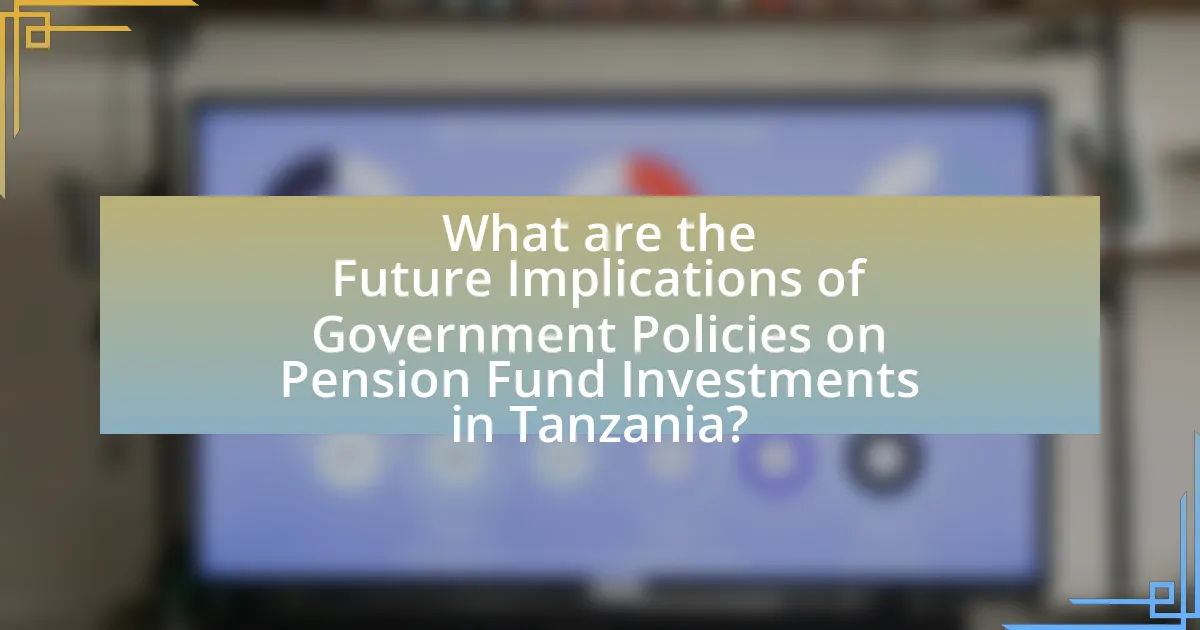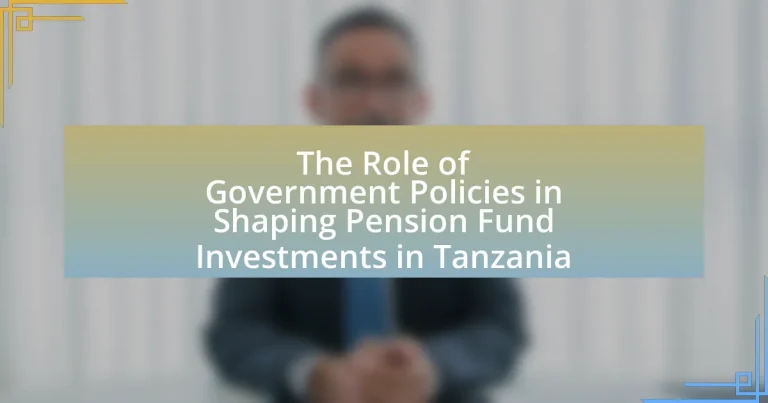The article examines the critical role of government policies in shaping pension fund investments in Tanzania. It highlights how regulatory frameworks, such as the Pension Funds Act of 2008, influence investment strategies, asset allocation, and risk management for pension funds. Key policies, including mandatory contributions and investment guidelines, are discussed in relation to their impact on the performance and sustainability of pension funds. Additionally, the article addresses challenges posed by regulatory constraints and macroeconomic factors, as well as emerging trends that could affect future investment strategies in the sector.

What is the Role of Government Policies in Shaping Pension Fund Investments in Tanzania?
Government policies play a crucial role in shaping pension fund investments in Tanzania by establishing regulatory frameworks that dictate investment strategies and asset allocation. The Tanzanian government, through the National Social Security Fund (NSSF) and other regulatory bodies, sets guidelines that influence how pension funds can invest in various sectors, including real estate, infrastructure, and equities. For instance, the Pension Funds Act of 2008 mandates that a certain percentage of pension fund assets must be allocated to government securities, ensuring that pension funds contribute to national development while securing stable returns for beneficiaries. This regulatory environment not only protects the interests of pension fund members but also aligns investment activities with national economic priorities, thereby fostering sustainable growth in Tanzania’s financial markets.
How do government policies influence pension fund investment strategies?
Government policies significantly influence pension fund investment strategies by establishing regulatory frameworks, tax incentives, and investment guidelines. For instance, in Tanzania, the government mandates pension funds to invest a certain percentage of their assets in government securities, which ensures liquidity and stability in the financial system. Additionally, policies that promote infrastructure development can lead pension funds to allocate resources towards long-term projects, aligning with national economic goals. Furthermore, tax regulations can incentivize pension funds to invest in specific sectors, such as renewable energy, thereby shaping their overall investment portfolios. These policies create a structured environment that directs pension funds towards investments that support both their financial objectives and national development priorities.
What specific policies have been implemented in Tanzania regarding pension funds?
The specific policies implemented in Tanzania regarding pension funds include the establishment of the National Social Security Fund (NSSF) and the Public Service Social Security Fund (PSSSF), which were designed to enhance social security coverage. The NSSF, established in 1997, aims to provide retirement benefits to employees in the private sector, while the PSSSF, created in 2018, serves public sector employees. Additionally, the government has mandated that all employers contribute a minimum of 10% of employees’ salaries to these funds, ensuring a steady inflow of capital for pension investments. These policies are supported by the Social Security Regulatory Authority (SSRA), which oversees compliance and promotes the sustainability of pension funds in Tanzania.
How do these policies affect the risk and return profiles of pension fund investments?
Government policies significantly influence the risk and return profiles of pension fund investments in Tanzania by establishing regulatory frameworks that dictate investment strategies and asset allocations. For instance, policies that encourage diversification can reduce risk by spreading investments across various asset classes, while those that impose restrictions on certain high-risk investments may limit potential returns. Additionally, government incentives for investing in specific sectors, such as infrastructure, can enhance returns but may also introduce sector-specific risks. Historical data indicates that pension funds adhering to government guidelines have experienced varying levels of volatility and performance, reflecting the direct impact of these policies on their investment outcomes.
Why are government policies critical for pension fund management?
Government policies are critical for pension fund management because they establish the regulatory framework that governs investment strategies, risk management, and fund governance. In Tanzania, these policies dictate how pension funds can allocate assets, ensuring compliance with national financial stability goals and protecting beneficiaries’ interests. For instance, the Pension Reform Act of 2008 in Tanzania set guidelines for fund management, including investment limits and reporting requirements, which enhance transparency and accountability. Such regulations help mitigate risks associated with investment decisions, ultimately safeguarding the financial security of retirees.
What are the implications of government regulations on pension fund performance?
Government regulations significantly impact pension fund performance by establishing investment guidelines, risk management protocols, and compliance requirements. These regulations can enhance fund stability and protect beneficiaries by ensuring that pension funds adhere to prudent investment practices. For instance, regulations may limit the types of assets that pension funds can invest in, which can lead to lower returns if the restricted assets underperform compared to the broader market. Additionally, regulatory frameworks often require pension funds to maintain certain liquidity levels, which can restrict their ability to invest in higher-yielding, illiquid assets. In Tanzania, the Pension Reform Act of 2008 introduced measures aimed at improving transparency and governance, which have been shown to positively influence fund performance by fostering investor confidence and encouraging long-term investment strategies.
How do government policies ensure the sustainability of pension funds?
Government policies ensure the sustainability of pension funds by establishing regulatory frameworks that promote financial stability and investment diversification. These policies often include mandatory contributions from employers and employees, which secure a steady inflow of capital into pension funds. For instance, in Tanzania, the Social Security Regulatory Authority mandates that employers contribute a specific percentage of employees’ salaries to pension schemes, ensuring a consistent funding source. Additionally, government policies may set investment guidelines that require pension funds to diversify their portfolios across various asset classes, reducing risk and enhancing long-term returns. This approach is supported by the Pension Act of 2008 in Tanzania, which outlines investment limits and encourages funds to invest in infrastructure projects, thereby contributing to economic growth while safeguarding pension assets.
What challenges do government policies pose for pension fund investments in Tanzania?
Government policies in Tanzania pose several challenges for pension fund investments, primarily through regulatory constraints, limited investment options, and macroeconomic instability. Regulatory constraints include stringent investment guidelines that restrict pension funds from diversifying their portfolios, which can limit potential returns. Limited investment options arise from a lack of developed financial markets, making it difficult for pension funds to find suitable assets to invest in. Additionally, macroeconomic instability, characterized by inflation and currency fluctuations, can adversely affect the real value of pension fund assets, leading to reduced benefits for retirees. These challenges hinder the ability of pension funds to achieve optimal growth and secure financial futures for their members.
What are the barriers to effective policy implementation in the pension sector?
Barriers to effective policy implementation in the pension sector include inadequate regulatory frameworks, lack of stakeholder engagement, insufficient funding, and limited data availability. In Tanzania, the regulatory framework often lacks clarity, leading to confusion among pension fund managers and beneficiaries. Additionally, stakeholder engagement is often minimal, resulting in policies that do not reflect the needs of all parties involved. Funding constraints hinder the ability to implement comprehensive pension programs, while limited data availability restricts informed decision-making and policy adjustments. These factors collectively impede the successful execution of pension policies in Tanzania.
How do political and economic factors impact pension fund regulations?
Political and economic factors significantly impact pension fund regulations by influencing the legal framework, funding requirements, and investment strategies of pension funds. For instance, political stability fosters a conducive environment for regulatory reforms, while economic conditions, such as inflation rates and GDP growth, dictate the financial health of pension funds. In Tanzania, government policies have been shaped by the need to ensure sustainable pension systems, as evidenced by the National Pension Act of 2012, which aimed to enhance the management and investment of pension assets in response to economic challenges. Furthermore, economic downturns can lead to stricter regulations to protect beneficiaries, while political agendas may prioritize pension reforms to gain public support, demonstrating the intertwined nature of these factors in shaping pension fund regulations.

How do Government Policies Affect the Investment Landscape for Pension Funds in Tanzania?
Government policies significantly influence the investment landscape for pension funds in Tanzania by establishing regulatory frameworks, tax incentives, and investment guidelines. For instance, the Tanzanian government has implemented the National Pension Fund Act, which mandates pension funds to invest a minimum percentage of their assets in government securities, thereby ensuring liquidity and stability in the financial system. Additionally, policies promoting infrastructure development encourage pension funds to invest in long-term projects, aligning with their need for stable returns. Furthermore, tax incentives for investments in certain sectors, such as renewable energy, enhance the attractiveness of these opportunities for pension funds. These policies collectively shape the risk-return profile of pension fund investments, guiding their allocation strategies and overall investment behavior in Tanzania.
What types of investments are encouraged or restricted by government policies?
Government policies in Tanzania encourage investments in infrastructure, agriculture, and renewable energy while restricting investments in speculative ventures and certain foreign investments. The Tanzanian government promotes infrastructure projects to enhance economic growth, as seen in initiatives like the National Development Vision 2025, which aims to transform the country into a middle-income economy. Additionally, policies favor agricultural investments to ensure food security and boost local production. Conversely, the government restricts speculative investments to mitigate financial risks and protect pension funds from volatility, as outlined in the Pension Act of 2008, which emphasizes prudent investment strategies for pension funds.
How do investment guidelines shape the asset allocation of pension funds?
Investment guidelines significantly influence the asset allocation of pension funds by establishing parameters for risk tolerance, investment types, and diversification strategies. These guidelines dictate how pension funds can allocate their assets across various classes, such as equities, bonds, and real estate, ensuring compliance with regulatory requirements and aligning with the fund’s long-term objectives. For instance, in Tanzania, the National Social Security Fund (NSSF) follows specific investment guidelines that mandate a minimum allocation to government securities, which stabilizes the fund’s portfolio while providing predictable returns. This regulatory framework shapes the overall investment strategy, ensuring that pension funds maintain a balanced approach to risk and return, ultimately safeguarding beneficiaries’ interests.
What role do tax incentives play in pension fund investment decisions?
Tax incentives significantly influence pension fund investment decisions by enhancing the attractiveness of certain investment options. These incentives, such as tax deductions on contributions and tax exemptions on investment income, encourage pension funds to allocate capital towards specific sectors, including infrastructure and real estate. For instance, in Tanzania, the government has implemented tax policies that favor investments in local development projects, which can yield higher returns for pension funds while simultaneously supporting national economic growth. This alignment of financial benefits with government objectives demonstrates how tax incentives can effectively guide pension fund strategies and investment choices.
How do government policies interact with global investment trends?
Government policies significantly influence global investment trends by creating regulatory environments that either encourage or deter foreign investment. For instance, countries with favorable tax regimes, stable political climates, and transparent legal frameworks attract more foreign direct investment (FDI), as evidenced by the World Bank’s Ease of Doing Business Index, which ranks countries based on their regulatory environment. Conversely, restrictive policies, such as high tariffs or stringent capital controls, can lead to decreased investment flows, as seen in nations that have implemented such measures and subsequently experienced capital flight. Thus, the interaction between government policies and global investment trends is characterized by the ability of policies to shape investor confidence and market accessibility.
What international standards influence Tanzanian pension fund regulations?
International standards that influence Tanzanian pension fund regulations include the International Financial Reporting Standards (IFRS) and the International Organization of Pension Supervisors (IOPS) guidelines. The IFRS provides a framework for financial reporting that enhances transparency and comparability in pension fund financial statements, while the IOPS offers best practices for pension supervision, promoting effective governance and risk management. These standards are adopted to align Tanzanian regulations with global practices, ensuring that pension funds operate efficiently and securely, thereby protecting the interests of beneficiaries.
How do global economic conditions affect local pension fund policies?
Global economic conditions significantly influence local pension fund policies by affecting investment strategies, risk assessments, and funding levels. For instance, during periods of global economic downturn, pension funds may adopt more conservative investment approaches to mitigate risks, leading to increased allocations in safer assets like government bonds. Conversely, in a robust global economy, pension funds might pursue higher returns through investments in equities or alternative assets. Additionally, fluctuations in global interest rates can impact the discount rates used in pension fund valuations, directly affecting funding requirements and contributions. Historical data shows that the 2008 financial crisis prompted many pension funds worldwide to reassess their asset allocations, resulting in a shift towards more stable investments to protect beneficiaries’ interests.

What are the Future Implications of Government Policies on Pension Fund Investments in Tanzania?
Government policies in Tanzania are likely to significantly influence the future of pension fund investments by shaping regulatory frameworks, investment strategies, and risk management practices. For instance, the Tanzanian government has been actively promoting local investments through policies that encourage pension funds to allocate a portion of their assets to domestic infrastructure projects, which can enhance economic growth and provide stable returns. Additionally, the introduction of stricter regulations on investment diversification and risk assessment may lead pension funds to adopt more conservative investment approaches, potentially limiting their exposure to higher-yielding but riskier assets. These policy shifts are supported by the government’s commitment to financial sector reforms aimed at increasing transparency and accountability, which can foster greater investor confidence and stability in the pension fund sector.
How might upcoming policy changes impact pension fund strategies?
Upcoming policy changes may significantly alter pension fund strategies by introducing new regulations that dictate investment allocations and risk management practices. For instance, if the Tanzanian government implements stricter guidelines on asset diversification, pension funds may need to adjust their portfolios to comply, potentially reducing exposure to high-risk assets. Additionally, changes in tax incentives for certain investments could shift fund managers’ focus toward more tax-efficient strategies, impacting overall returns. Historical data from similar policy shifts in other countries, such as the introduction of mandatory pension fund contributions in Kenya, illustrates that regulatory changes can lead to a reallocation of assets and a shift in investment priorities among pension funds.
What trends are emerging in government policy that could affect pension funds?
Emerging trends in government policy that could affect pension funds in Tanzania include increased regulatory oversight, a push for sustainable investment practices, and the introduction of tax incentives for pension fund contributions. The Tanzanian government has been implementing stricter regulations to ensure transparency and accountability in pension fund management, which aims to protect beneficiaries and enhance trust in the system. Additionally, there is a growing emphasis on environmental, social, and governance (ESG) criteria, encouraging pension funds to invest in sustainable projects that align with national development goals. Furthermore, the government is considering tax incentives to encourage higher contributions to pension funds, which could lead to increased capital for investment and improved retirement security for citizens. These trends reflect a broader commitment to strengthening the pension system and ensuring its sustainability in the face of economic challenges.
How can pension funds adapt to evolving regulatory environments?
Pension funds can adapt to evolving regulatory environments by implementing robust compliance frameworks and actively engaging with policymakers. These funds must continuously monitor regulatory changes and assess their impact on investment strategies, ensuring alignment with new requirements. For instance, in Tanzania, pension funds have adjusted their portfolios to comply with the National Pension Fund Act, which mandates specific investment allocations. By leveraging technology for real-time regulatory tracking and fostering relationships with regulatory bodies, pension funds can remain agile and responsive to changes, thereby safeguarding their investments and ensuring compliance.
What best practices should pension funds adopt in response to government policies?
Pension funds should adopt a proactive approach to align their investment strategies with government policies by conducting regular policy assessments and adjusting their portfolios accordingly. This involves closely monitoring changes in regulations, tax incentives, and economic policies that impact investment opportunities. For instance, in Tanzania, the government has emphasized infrastructure development, which presents pension funds with opportunities to invest in public-private partnerships. By integrating these insights into their investment strategies, pension funds can enhance returns while supporting national development goals. Additionally, engaging with policymakers to advocate for favorable investment conditions can further strengthen the alignment between pension fund strategies and government objectives.
How can pension funds enhance compliance with government regulations?
Pension funds can enhance compliance with government regulations by implementing robust governance frameworks and regular audits. These frameworks ensure that pension funds adhere to legal requirements and industry standards, thereby minimizing the risk of non-compliance. Regular audits, conducted by independent third parties, provide an objective assessment of compliance levels and highlight areas for improvement. For instance, the Tanzanian government has established specific guidelines for pension fund operations, and adherence to these guidelines is crucial for maintaining regulatory compliance. By actively engaging in training programs for staff on regulatory changes and best practices, pension funds can further strengthen their compliance efforts.
What strategies can be employed to optimize investment performance under current policies?
To optimize investment performance under current policies in Tanzania, pension funds should adopt a diversified investment strategy that includes a mix of domestic and international assets. This approach mitigates risks associated with local market volatility and enhances potential returns. For instance, investing in government bonds, equities, and real estate can provide stable income and capital appreciation.
Additionally, pension funds should leverage technology for data analytics to identify market trends and optimize asset allocation. Research indicates that funds utilizing advanced analytics have outperformed their peers by 20% over a five-year period, demonstrating the effectiveness of informed decision-making.
Furthermore, engaging in active management rather than passive strategies can yield better results in fluctuating markets. Studies show that actively managed funds have historically outperformed index funds in emerging markets, which is relevant to Tanzania’s evolving economic landscape.
Lastly, fostering partnerships with local businesses can enhance investment opportunities and support economic growth, aligning with government policies aimed at boosting local industries. This strategy not only optimizes returns but also contributes to national development goals.





